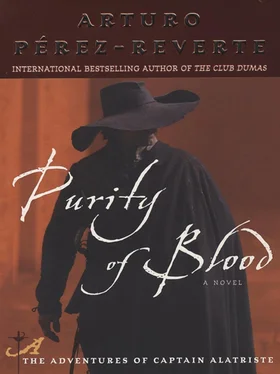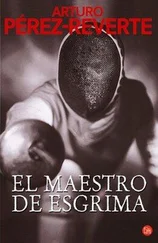Arturo Pérez-Reverte - Purity of Blood
Здесь есть возможность читать онлайн «Arturo Pérez-Reverte - Purity of Blood» весь текст электронной книги совершенно бесплатно (целиком полную версию без сокращений). В некоторых случаях можно слушать аудио, скачать через торрент в формате fb2 и присутствует краткое содержание. Жанр: Старинная литература, на английском языке. Описание произведения, (предисловие) а так же отзывы посетителей доступны на портале библиотеки ЛибКат.
- Название:Purity of Blood
- Автор:
- Жанр:
- Год:неизвестен
- ISBN:нет данных
- Рейтинг книги:3 / 5. Голосов: 1
-
Избранное:Добавить в избранное
- Отзывы:
-
Ваша оценка:
- 60
- 1
- 2
- 3
- 4
- 5
Purity of Blood: краткое содержание, описание и аннотация
Предлагаем к чтению аннотацию, описание, краткое содержание или предисловие (зависит от того, что написал сам автор книги «Purity of Blood»). Если вы не нашли необходимую информацию о книге — напишите в комментариях, мы постараемся отыскать её.
Purity of Blood — читать онлайн бесплатно полную книгу (весь текст) целиком
Ниже представлен текст книги, разбитый по страницам. Система сохранения места последней прочитанной страницы, позволяет с удобством читать онлайн бесплатно книгу «Purity of Blood», без необходимости каждый раз заново искать на чём Вы остановились. Поставьте закладку, и сможете в любой момент перейти на страницу, на которой закончили чтение.
Интервал:
Закладка:
After Elvira was taken away, I saw that it was not long before my turn. The plaza began to whirl before me; I was numb with terror and shame. Desperate, I looked for the face of Captain Alatriste or some friend to find comfort, but I found nothing, not one trace of pity or sympathy. Nothing but a wall of hostile faces, jeering, expectant, sinister. The face a mob adopts when treated to free barbaric spectacles.
But Alatriste saw me. He was again beside one of the columns of the arches, and from there could see the bench where I sat with other penitents, each of us flanked by a pair of constables as mute as stones. Preceding me in the fateful ritual was a barber accused of blasphemy and of making a pact with the Devil—a short, wretched-looking man who sobbed with his face in his hands because no one was going to save him from his hundred lashes and years of flogging fish in the galleys of our lord and king.
The captain moved on a little, placing himself where I could see him if I looked in that direction, but I was not capable of seeing anything, sunk as I was in the torment of my own nightmare. Beside Alatriste, a pillicock garbed in his best was ridiculing those of us on the platform, pointing us out, between gibes, to his companions, and at a certain moment he made some jeering comment about me. Up to that point, the captain’s habitual restraint had tempered his impotent rage, but now that anger made him turn, without a moment’s reflection and, as if accidentally, swing an elbow into the churl’s gut. The man whirled about with an angry frown, but his protest died in his throat when he looked into the gray-green eyes of Diego Alatriste, staring at him with such menacing coldness that he closed up like a tulip at eventide.
Again Alatriste moved on, and as he did, he could better see Luis de Alquézar in his loge. The royal secretary stood out from other officials because of the embroidered cross of Calatrava on his chest. He was in black, and his round head with its feathery hair was rigid atop the starched collar: he might have been a figure in a painting. His clever eyes, however, were darting from side to side, taking in every detail of the events. At times that evil gaze focused on the fanatic countenance of Fray Emilio Bocanegra, and in their sinister immobility his eyes seemed to have communicated perfectly. At that moment and in that place they were the embodiment of true power in that court of venal functionaries and fanatic priests. They acted under the diffident regard of the fourth Hapsburg, who was watching his subjects condemned to the stake without lifting an eyebrow, reacting only to turn from time to time to the queen to explain, behind the cover of a glove or a blue-veined hand, some detail of the spectacle. Elegant, chivalrous, affable, and weak, he was the august plaything of his advisors. Hieratical, incapable of seeing earth, he gazed always toward heaven. Unsuited for bearing upon his royal shoulders the grand heritage of his ancestors, he was dragging us along the road to the abyss.
My fate was beyond remedy, and had the plaza not been swarming with catchpoles, constables, familiares, and royal guards, perhaps Diego Alatriste would have done something barbarous, desperate, and heroic. At least I like to believe that he would, given the opportunity. But all was futile; time was running against him and against me. Even should don Francisco de Quevedo arrive, once my custodians pulled me to my feet and led me toward the dais where the sentences were being read, neither our lord and king nor the Pope of Rome could alter my fate. And no one knew what he might bring, in any case, that would alter anything, even should he arrive in the dwindling few seconds.
The captain was agonizing over that very knowledge when he became aware that Luis de Alquézar was looking directly at him. Actually it was impossible to know that, for Alatriste was nearly invisible beneath his hat in the midst of that mob of people. Yet he was sure that Alquézar’s eyes had been focused on him; then he saw the royal secretary catch Fray Emilio Bocanegra’s eye, and he, as if he had just received a message, turned to scour the crowd. Alquézar slowly lifted one hand to his chest, and he seemed to be searching for someone among the throng to Alatriste’s left, for his eyes were fixed on a point there. The hand slowly rose and fell, twice, and the secretary again looked toward the captain. Alatriste turned and sighted two or three hats moving toward the place where he was standing beneath the arches.
The captain’s instinct took charge before his mind could analyze the situation. Swords were useless in such a tightly packed crowd, so he readied the dagger he wore at his left side, freeing it from the tail of his short cape. Then he faded back among the spectators. Imminent danger had always given him a clear mind and a practical economy of actions and words. He moved along the row of columns, and saw the hats stop, indecisive, at the spot where he had been. He quickly glanced toward Luis de Alquézar’s loge, where the secretary was still scrutinizing the throng below; the rigid impassivity demanded by protocol could not hide his irritation.
Alatriste moved on toward the de la Carne arches and the other side of the plaza, and peered up at the platform from that angle. He could not see me, but he did have a good view of Alquézar’s profile. He was grateful that he had not brought his pistol—they were forbidden, and among so many people it was dangerous to move about with one on him—for he might not have been able to suppress the impulse to leap onto the platform and roast the secretary’s chestnuts with one shot. But you will die, he swore mentally, eyes drilling into the royal secretary’s despicable face. And until the day you do, you will remember my visit. You will never sleep easily again.
They had brought the barber accused of blasphemy to the dais, and were beginning the long relation of his crime and sentence. Alatriste thought he remembered that I came after the barber, and he was trying to edge a little closer so he could see me, when he again caught sight of the hats, now dangerously close. These were obviously tenacious men. One had dropped back, as if to search in a different part of the crowd; but two of them—a black felt and another brown with a long plume—were progressing in his direction, breasting their way through the sea of humanity.
There was no choice but to take cover, so the captain had to give up trying to see me and retreat beneath the arches. He would not have the ghost of a chance among that throng; all anyone had to do was call upon the minions of the Holy Office and every man down to the last idler would join in the chase. The opportunity to slip away was only a few steps farther on: a narrow alley with two sharp turns that led to the Plaza de la Provincia. On days like these, people used the alley to relieve themselves, despite the crosses and saints the residents placed at each corner to discourage that practice. The captain walked in that direction, and just before plunging into the narrow passageway, in which no more than one person could move at a time, he glanced over his shoulder and saw two figures emerging from the crowd, right on his heels.
He did not even venture a longer look. He quickly unfastened his short cape, wrapped it around his left arm to serve as a buckler, and with his right hand unsheathed the vizcaína —to the shock of a poor man emptying his bladder at the first turn, who when he saw the weapon, made fumble-fingered attempts to fasten his breeches as quickly as possible. Ignoring him, Alatriste set one shoulder against the wall, which, like the ground, stunk of urine and filth. A fine place to be knifed, he thought as he took a tighter grip on the vizcaína. A fine place, pardiez, to go to hell in good company.
Читать дальшеИнтервал:
Закладка:
Похожие книги на «Purity of Blood»
Представляем Вашему вниманию похожие книги на «Purity of Blood» списком для выбора. Мы отобрали схожую по названию и смыслу литературу в надежде предоставить читателям больше вариантов отыскать новые, интересные, ещё непрочитанные произведения.
Обсуждение, отзывы о книге «Purity of Blood» и просто собственные мнения читателей. Оставьте ваши комментарии, напишите, что Вы думаете о произведении, его смысле или главных героях. Укажите что конкретно понравилось, а что нет, и почему Вы так считаете.











